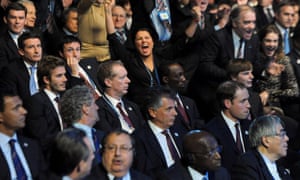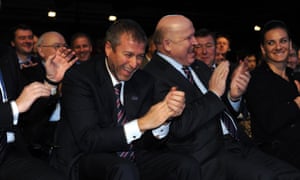As the World Cup finally dawns in the east, many of the Football Association chiefs packing their wheelie suitcases for Russia will have been reflecting wistfully that this was the tournament they bid for Fifa to locate in England, and lost. When the vote was taken in December 2010, Russia’s president, Vladimir Putin, famously arrived nonchalantly in Zurich to collect his prize and now the world will broadcast the greatest of sporting events from the country he rules absolutely.
England in their bid spent £21m and an enthusiastic but ultimately hapless two years seeking votes from a 24-man Fifa executive committee since found to have contained 17 members found guilty or accused of corruption or ethics rule breaches. Criminal investigations have started in Switzerland, France and the US into the process by which a majority of those members voted for Qatar to host the 2022 World Cup and for Russia to have the one starting on Thursday, after England’s entreaties received just two votes.
Yet little progress of those investigations has been reported. Both victorious countries’ bid teams and political rulers have denied wrongdoing in the vote-seeking campaigns, got on with building the promised stadiums and infrastructure and prepared to host the world’s football nations and broadcasters.
In an intriguing documentary, A World Cup of Spies, directed by the Danish film-makers Niels Borchert Holm and Jon Adelsten and recently broadcast on the ARTE TV channel, the chief executive of Russia’s organising committee, Alexey Sorokin, acknowledged the hope that the tournament will be good for Russia’s image.
After a sequence in which another Russian official laughs that people think of Russians having a gun in one hand and a vodka in the other, Sorokin acknowledges: “There are still some stereotypes people live by. The World Cup I hope will mean a lot for the country, a chance for us to show a new democratic country and people that have created a lot of progress.”
The World Cup has, of course, finally arrived with Russia’s image the very opposite of cleansed, particularly in England, following the poisoning of the former Russian spy Sergei Skripal and his daughter Yulia, and the multiple hostilities and cyber-attacks of which Putin’s Russia stands accused. Fifa maintained Russia as the host throughout the revelations that its sports ministry had overseen a huge athlete doping programme, which led to the International Olympic Committee banning the country’s team from competing in the winter Olympics in Pyeongchang. The sports minister at the time of the doping, Vitaly Mutko, since promoted to deputy prime minister, stepped down from his football roles in Russia and is no longer visible as the politician most associated with Fifa’s tournament.
The ARTE documentary film-makers put to Sorokin the accusation long understood to be true by the England bid that Russia had officers from its secret service, the FSB, post-Communist successor to the KGB, spying on their activities. Sorokin laughed: “Honestly I don’t know what to say about it. I was never aware of any of their involvement; certainly I was not the reason for any involvement of any intelligence service.”

It is well-established, however, that the English FA did in fact employ intelligence operators itself, including the former MI6 officer in Russia, Christopher Steele, now known globally for his dossier on the US president Donald Trump’s activities in Russia. One well-placed source confirmed to the Guardian that Steele was taken on eight months into the bid, when the English FA, confident in the country’s credentials and stock of stadiums, learned that Russia was a rival taking the opportunity very seriously.
Given that Russia eclipsed England in the vote, and the lack of proven evidence of wrongdoing, it has never been clear how valuable the intelligence was. A report about some of it was published in 2014 by the House of Commons select committee for culture, media and sport, in a letter from the Sunday Times, whose reporters had talked to an “ex MI6 source,” understood to be Steele. The letter said that: “Putin was understood to have summoned a select group of oligarchs and tasked them with doing whatever was necessary to ensure the victory of the Russia 2018 bid, including striking personal deals with voters.”
After Putin became properly engaged with the bid in February 2010, he did involve himself personally in it, and met several executive committee members, including some of the corrupt figures. That broke no rules. Every country’s senior politicians see World Cup hosting as a trophy and England’s bid advanced Britain’s then prime minister, David Cameron, and Prince William to press executive committee members’ flesh during the final claustrophobic days in Zurich.
The Chelsea owner, Roman Abramovich, was publicly prominent as one of the oligarchs supporting the Russia bid – he was in the Zurich hall for the victory and can be seen in the television footage behind Sorokin, smiling and applauding.

Of this alleged Russia operation the MI6 source was quoted as having told the reporters that “nothing was written down” and that it would all have been “deniable”.
There were no firm allegations made against individuals, except the letter reporting that sources had said a Picasso painting had been given to the then Uefa president, Michel Platini, and the Belgian executive committee member, Michel D’Hooghe, had been given a valuable artwork, later reported also to be a Picasso. Platini rejected that claim as “totally fictitious”. Fifa’s ethics committee investigation accepted D’Hooghe’s evidence that he had indeed been given a painting by Vyacheslav Koloskov, a lobbyist for the Russian bid, but that it was by an unknown artist, painted on cardboard, and worthless.
The investigation, conducted by Fifa’s then deputy ethics committee chairman, the Swiss prosecutor Cornel Borbély, cleared Russia of any impropriety or rule breaches. Famously Borbély accepted that the bid had been conducted on borrowed computers – from a football foundation which “appeared to have been linked to Mr Roman Abramovich”. Borbély reported that the computers were returned to the football foundation after the bid was won, and then: “The owner has confirmed that the computers were destroyed.”
Borbély noted he had not been given many documents and concluded that no wrongdoing by Russia’s bid had been substantiated. After the former FA chairman, Lord Triesman, had been exposed by a newspaper alleging collusion between Russia and Spain, Triesman had withdrawn that allegation and the FA officially apologised.
In his acceptance speech in Zurich Putin said pointedly that it was a great honour which his country had won, after a “tight – and fair – fight”.
The FA under its chairman, Greg Clarke, is understood to be keen to bid yet again, to host the tournament when it is next available, in 2030 – but officials are approaching the process a little more warily this time.